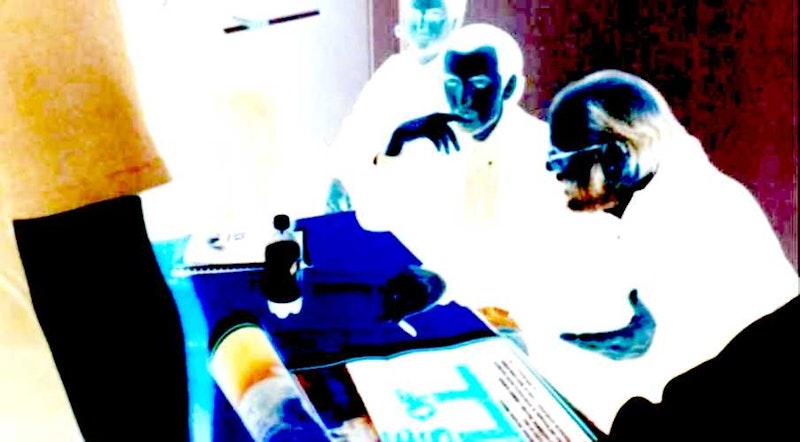This is the part in the story where we meet. I knew Rooster was traveling with Paul and Meredith, just as I was guiding Enzo and Giuseppe on their final voyage together. By the time Mr. B. Bucci arrived at the Hotel Pennsylvania for the two-day Fangoria Horror Convention, he had less than two months to live. Although he'd made a living as a filmmaker, he was hated in his home country. Artists fear indifference, with good reason; if someone fucking hated a book or song you wrote, or even a film, at least you got a reaction out of them. Maybe you wanted them to hate you. Not Enzo. Enzo did not like being a “cult favorite.” One of his ex-wives tried in vain to console him once, alluding to his considerable popularity in North America. This is around 1987, just as he was preparing to make Breast Blaster, an underrated mix of Fame, Carrie, and Beastmaster.
Donatella Bucci told her husband that his tapes sold well in New York, and that maybe he should go—she brought up William Lustig, Abel Ferrara, Curtis Hanson, but Enzo couldn’t be bothered. “These people, they’ve been able to do what they want to do. No, yes, what you say about their films, yes, but they’re young. They can make a film for $10,000. I not only can’t but more importantly, don’t want to.” Donatella was finished with this conversation but Enzo wasn’t: “So please don’t bring up rich Americans who rip my movies off and then expect to kiss the ring when they meet me. I’ve turned them all down.” Enzo, of course, wasn’t as eloquent as that, or as verbose—Donatella divorced him the next day.
In 1991, his last ex-wife, Serafina, took a call from a young man in Los Angeles who somehow got Enzo’s home phone number. “I’m about to make my first movie and if it’s at all possible I’d love to just ask the maestro a few questions. I’m a massive, massive fan of his work. I used to work in a video store and I always pushed The Yellow Veil of Monica on everyone who came in.” (The author, unfortunately, did not feature in this film). Serafina took down the young man’s name and asked him to stay on the line, which he did for 45 minutes, until Serafina came back and told him Enzo wasn’t available. The young man thanked her for trying and hung up. What actually happened was Enzo flew into a rage, offended that his 22-year-old wife would bother him in his study with some random phone call from some American loser named “Quentin Tarantino.”
So by the time Enzo and Giuseppe pulled up to the Hotel Pennsylvania, directly across the street from Madison Square Garden, the man was full of regret. All of his children were dead, his wives left him, and the only woman he ever loved—Edwige—died so many years ago. None of his films were successful or respected in Italy, and even if Americans liked them, so what? What good exactly did the video store do for him? Enzo didn’t make any money on frequent rentals. You get one shot in the film business, and it’s on the first pass. None of Enzo’s movies made money in his lifetime, unlike Lucio Fulci, who did experience a major renaissance when the man who Enzo refused to speak to became massively famous and touted Fulci’s films as often as those of Brian De Palma and Jack Hill. Enzo knew he fucked up—Fulci bragged about it to him, even telling him the call came on the same day, and, Fulci confirmed Tarantino’s fears: Enzo was blowing him off. And he never forgave him.
As they pulled up to the hotel, another young fan came running up, this one a young woman; but Enzo, nor Giuseppe, saw her on that street, and Meredith just missed getting a chance to talk to one of her idols one-on-one, one night in New York City, January 1996. She fished her ticket out of her parka and walked into the hotel with her head down, alone.
—Follow Monica Quibbits on Twitter: @MonicaQuibbits

